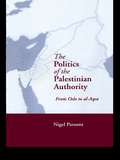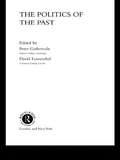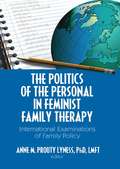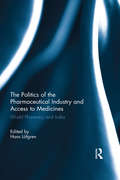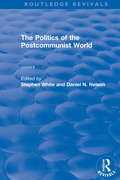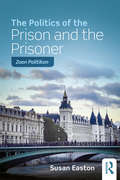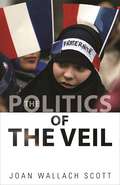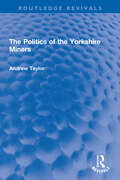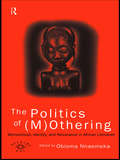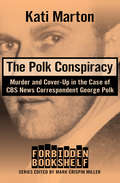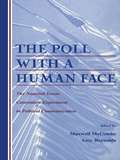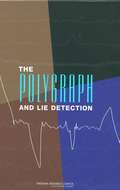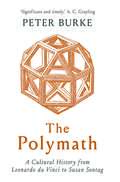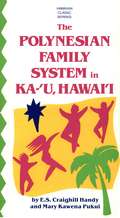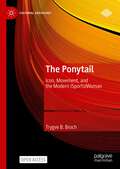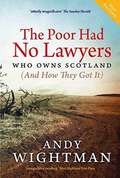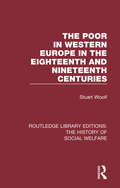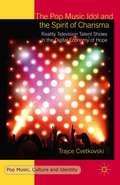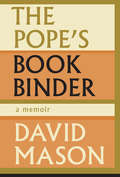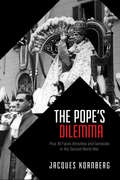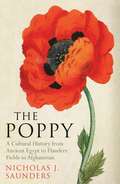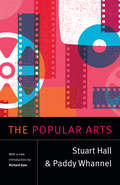- Table View
- List View
The Politics of the Palestinian Authority: From Oslo to Al-Aqsa
by Nigel ParsonsThis book explores the development of the Palestinian Liberation Organization (PLO) from a liberation movement to a national authority, the Palestinian National Authority (PNA). Based on intensive fieldwork in the West Bank, Gaza and Cairo, Nigel Parsons analyzes Palestinian internal politics and their institutional-building by looking at the development of the PLO. Drawing on interviews with leading figures in the PLO and the Palestinian Authority, delegates to the negotiations with Israel, and the Palestinian political opposition, it is a timely account of the Israel/Palestine conflict from a Palestinian political perspective.
The Politics of the Past (One World Archaeology #Vol. 12)
by David Lowenthal Peter Gathercole'History is written by the winners' is the received wisdom. This book explains why historical interpretation has to incorporate perspectives from those other than 'winners', and demonstrates archaeology's crucial role in this wide-ranging approach. The book draws more on Africa, Afro-America, Australasia and Oceania than on Europe, the source of the traditionally dominant perspective in archaeology. The four organizing themes of The Politics of the Past are the forms and consequences of the Eurocentric heritage, the conflicting perspectives of rulers and ruled, the significance of administrative and institutional rivalries, and the cleavages that divide professional from popular views of archaeology. Archaeologists, anthropologists, historians and other scholars will find The Politics of the Past illuminating and provocative. It will enrich historical and archaeological inquiry and interpretation, and ramify their relevance for public policy.
The Politics of the Past in an Argentine Working-Class Neighbourhood
by Lindsay DuboisThe Argentine dictatorship of 1976 to 1983 set out to transform Argentine society. Employing every means at its disposal - including rampant violation of human rights, union busting, and regressive economic policies - the dictatorship aimed to create its own kind of order. Lindsay DuBois's The Politics of the Past explores the lasting impact of this authoritarian transformative project for the people who lived through it. DuBois's ethnography centres on José Ingenieros, a Buenos Aires neighbourhood founded in a massive squatter invasion in the early 1970s, and describes how the military government's actions largely subdued a politically engaged community. DuBois traces how state repression and community militancy are remembered in Joé Ingenieros and how the tangled and ambiguous legacies of the past continued to shape ordinary people's lives years after the collapse of the military regime. This rich and evocative study breaks new ground in its exploration of the complex relationships between identity, memory, class formation, neoliberalism, and state violence.
The Politics of the Personal in Feminist Family Therapy: International Examinations of Family Policy
by Anne M. Prouty LynessAddress the issues vital for women and their familiesTo be most effective, family therapists need to understand precisely what policies are in place and how they influence families and their relationships. The Politics of the Personal in Feminist Family Therapy: International Examinations of Family Policy provides an interdisciplinary look at family public and social policies and the influence they have on families around the globe-all from a feminist perspective. Diverse international family policy experts discuss policies family therapists need to know covering gender, ethnicity, religion, and age, and the effects on women and their families.As international family public policy shifts and changes, women and their families&’ lives are altered in substantial and very personal ways. The Politics of the Personal in Feminist Family Therapy gives therapists a clear view of policies and diverse issues involving family policy, family relationships, and mental health. The book reveals the interaction between policy and practice, interdependence as a principle of child and family policy, ways to increase women&’s labor force participation without causing a fall in birth rates, and intergenerational equity debates around the world. Qualitative studies are presented detailing women&’s experiences of family policies&’ effects on their lives, including their resiliency in times of disruption and their viewpoints on life-altering events that are used to disempower them. Topics in The Politics of the Personal in Feminist Family Therapy include: the interaction of British social policy with feminist practice supportive rather than punitive interventions in the lives of families an examination of the Organization for Economic Cooperation and Development&’s Babies and Bosses report evaluation of international family policies of elder care research into women&’s roles and the way they are shaped in areas of conflict research on Puerto Rican and Dominican women&’s perceptions of divorceThe Politics of the Personal in Feminist Family Therapy is timely, stimulating reading for psychotherapists, family therapists, psychologists, social workers, counselors, feminists/womanists, sociologists, educators and students in family studies, women&’s studies, gender studies, and war studies, and professionals in family policy and family law.
The Politics of the Pharmaceutical Industry and Access to Medicines: World Pharmacy and India
by Hans LöfgrenThe book studies the pharmaceutical industry of India. It is one of the most successful stories of economic expansion and improvements in public health. Indian firms have made access to quality medicines possible and affordable in many developing countries. Indian pharmaceuticals are also exported on a large scale to the United States and other highly regulated markets. A wave of mergers, acquisitions and tie-ups point to growing integration between Indian firms and global pharma multinationals.
The Politics of the Postcommunist World (Routledge Revivals)
by Stephen White Daniel N. NelsonThis title was first published in 2001. This series brings together the most significant journal articles to appear in the field of comparative politics since the 1970s. The aim is to render accessible to teachers, researchers and students, an extensive range of essays as a basis for understanding established terrain and new ground.
The Politics of the Prison and the Prisoner: Zoon Politikon
by Susan EastonIn recent years there has been a resurgence of interest in the role of the prison as a source of political ideas and site of political engagement, as well as in the prisoner’s quest for citizenship. The rising number of prisoners has increased fiscal burdens, which has meant that imprisonment has become a more important political issue. There is also greater interest in the prison as a site of political activism and in the generation of radical political ideas within the prison context and the formation of political networks within prison which extend beyond the prison walls. This book considers the prison as a site of political protest, discusses the quest for citizenship and the denial or negation of citizenship in prison, examines the discovery of politics in prison and the role of the prison in increasing political awareness, explores the treatment of political prisoners and reflects on the prisoner as a political problem for politicians negotiating pressures from the media and the public when addressing prisoners’ demands. Drawing on a range of contemporary and historical topics such as prison riots, radicalisation and the denial of voting rights, and including discussion of cases from the UK, US and Russia, this book examines the prison as a political institution and as a site of both politicisation and political protest. This book will be of interest to students and academics engaged with prisons, penology, punishment and corrections.
The Politics of the Veil (The Public Square #7)
by Joan Wallach ScottIn 2004, the French government instituted a ban on the wearing of "conspicuous signs" of religious affiliation in public schools. Though the ban applies to everyone, it is aimed at Muslim girls wearing headscarves. Proponents of the law insist it upholds France's values of secular liberalism and regard the headscarf as symbolic of Islam's resistance to modernity. The Politics of the Veil is an explosive refutation of this view, one that bears important implications for us all. Joan Wallach Scott, the renowned pioneer of gender studies, argues that the law is symptomatic of France's failure to integrate its former colonial subjects as full citizens. She examines the long history of racism behind the law as well as the ideological barriers thrown up against Muslim assimilation. She emphasizes the conflicting approaches to sexuality that lie at the heart of the debate--how French supporters of the ban view sexual openness as the standard for normalcy, emancipation, and individuality, and the sexual modesty implicit in the headscarf as proof that Muslims can never become fully French. Scott maintains that the law, far from reconciling religious and ethnic differences, only exacerbates them. She shows how the insistence on homogeneity is no longer feasible for France--or the West in general--and how it creates the very "clash of civilizations" said to be at the root of these tensions. The Politics of the Veil calls for a new vision of community where common ground is found amid our differences, and where the embracing of diversity--not its suppression--is recognized as the best path to social harmony.
The Politics of the Yorkshire Miners (Routledge Revivals)
by Andrew TaylorFirst published in 1984, The Politics of the Yorkshire Miners examines all aspects of political activity of the Yorkshire Area of the NUM. The book was written using original research from the archives of the Yorkshire Area combined with the author’s personal experience. It explores developments from 1945 onwards, and looks at internal politics within the Area, discussing the nature of policies on both industrial bargaining and wider political aims. It considers the role of sponsored MPs and their relationship to the Area, as well as the NUM’s ‘special relationship’ with the Labour Party. The structure of the Area and its role within the NUM nationally are also discussed, and detailed analysis is given to the strikes of 1972 and 1974.
The Politics of: Womanhood, Identity and Resistance in African Literature (Opening Out: Feminism for Today)
by Obioma NnaemekaThis collection is a study of African literature framed by the central, and multi-faceted, idea of 'mother' - motherland, mothertongue, motherwit, motherhood, mothering - looking at the paradoxical location of (m)other as both central and marginal. Whilst the volume stands as a sustained feminist analysis, it engages feminist theory itself by showing how issues in feminism are, in African literature, recast in different and complex ways.
The Polk Conspiracy: Murder and Cover-Up in the Case of CBS News Correspondent George Polk (Forbidden Bookshelf #9)
by Kati MartonIn war-torn Greece, the murder of a young American reporter sent a shock through the West and set the stage for the four-decade Cold War; now with a new introduction by the author Greece in 1948 was a country reeling from two major conflicts. The Nazi occupation and World War II had left it weakened, and the Greek Civil War—already raging for two years—had torn it apart. One of the earliest clashes of the Cold War, Greece&’s civil dispute pitted the American-backed royalist government against the Soviet-funded Greek Communist Party. Reporting at the front lines for CBS News, George Polk drew the ire of both sides with his uncompromising and incisive coverage. In mid-May, days after going missing, Polk was found dead, shot execution style with his hands and feet bound. What transpired next was a mad scramble of finger pointing and international outrage. To appease its American backers, the Greek government quickly secured the dubious confession of a Communist journalist—though the bulk of the evidence pointed to the royalists. An influential moment in the early days of the Cold War and a powerful force in the formation of the Truman Doctrine, the Polk conspiracy was emblematic of the ideological conflict that would embroil the globe for the next forty years.
The Poll With A Human Face: The National Issues Convention Experiment in Political Communication (Routledge Communication Series)
by Amy Reynolds Maxwell McCombsIn 1996, the National Issues Convention (NIC) assembled a national sample of 459 Americans on the campus of the University of Texas at Austin. This diverse group of Americans was seen and heard nationally. They spent three days in small group discussions of major public issues and participated in two live PBS telecasts moderated by Jim Lehrer where they questioned Vice President Al Gore and four contenders for the Republican presidential nomination. This experiment in democracy was an innovative step that engaged the ongoing debate about mass communication and democracy. The Poll With a Human Face details this innovative event, the arguments and logic behind it, the experiences of the delegates and journalists involved in the NIC, and social science research analyzing the news coverage and its effects. This book is both a specific case study of the NIC and a broad scale contribution to the discipline of political communication.
The Polygraph And Lie Detection
by Committee to Review the Scientific Evidence on the PolygraphThe polygraph, often portrayed as a magic mind-reading machine, is still controversial among experts, who continue heated debates about its validity as a lie-detecting device. As the nation takes a fresh look at ways to enhance its security, can the polygraph be considered a useful tool? The Polygraph and Lie Detection puts the polygraph itself to the test, reviewing and analyzing data about its use in criminal investigation, employment screening, and counter-intelligence. The book looks at: The theory of how the polygraph works and evidence about how deceptiveness — and other psychological conditions — affect the physiological responses that the polygraph measures. Empirical evidence on the performance of the polygraph and the success of subjects’ countermeasures. The actual use of the polygraph in the arena of national security, including its role in deterring threats to security. The book addresses the difficulties of measuring polygraph accuracy, the usefulness of the technique for aiding interrogation and for deterrence, and includes potential alternatives — such as voice-stress analysis and brain measurement techniques.
The Polymath: A Cultural History from Leonardo da Vinci to Susan Sontag
by Peter BurkeThe first history of the western polymath, from the fifteenth century to the present day From Leonardo Da Vinci to John Dee and Comenius, from George Eliot to Oliver Sacks and Susan Sontag, polymaths have moved the frontiers of knowledge in countless ways. But history can be unkind to scholars with such encyclopaedic interests. All too often these individuals are remembered for just one part of their valuable achievements. In this engaging, erudite account, renowned cultural historian Peter Burke argues for a more rounded view. Identifying 500 western polymaths, Burke explores their wide-ranging successes and shows how their rise matched a rapid growth of knowledge in the age of the invention of printing, the discovery of the New World and the Scientific Revolution. It is only more recently that the further acceleration of knowledge has led to increased specialisation and to an environment that is less supportive of wide-ranging scholars and scientists. Spanning the Renaissance to the present day, Burke changes our understanding of this remarkable intellectual species.
The Polynesian Family System in Ka-'U, Hawai'i
by e. s. Craighill Handy Mary Kawena PukuiThis classic book on Hawaiian families and culture is an essential text for anyone interested in pre-American Hawaii.The Polynesian Family System in Ka-'U, Hawai'i is a collaboration of the distinguished scholars Dr. Mary Puku and Dr. E.S. Craighill Handy. <P><P> It provides us with this fascinating review of traditional Hawaiian life. Manners and customs relating to birth, death, marriage, sexual practices, religious beliefs, and family relationship are all clearly described. The main sources of information were elderly Hawaiian informants of then remote Kacu district of the island of Hawaii.This Hawaiian history and culture book provides professional scholars and laymen a like with an unrivaled picture of traditional Hawaiian society. Based on original work in the field with living Hawaiians, it combines research into the literature by two authors of unusual qualifications with field work conducted under unique circumstances. This edition will be welcomed by librarians, anthropologists, and indeed all who have a serious interest in Polynesian life.
The Ponytail: Icon, Movement, and the Modern (Sports)Woman (Cultural Sociology)
by Trygve B. BrochThis open access book adopts a cultural sociology of materiality to explore the hallmark of the female athlete: the ponytail. Studying a wealth of news articles about ponytails in sports and society, Broch uncovers this hairstyle’s polyvocality and argues that it is a total social phenomenon. By separating his approach from the cultural studies tradition, Broch highlights how hair is imbued with codes, narratives, and myth that allow its wearers to understand, maneuver, and criticize social gender relations in deeply personal ways. Using multiple theories about hair, bodies, myths, and icons, he creates a multidimensional method to show how icons are imitated and used. As women navigate their practical lives, health issues, and gendered expectations, the ponytail materializes their dynamic maneuvering of cultural and social environments. Sporting a ponytail—itself an embodiment of movement—is filled with a performativity of social movements: a cultural kinetics that is never apolitical.
The Poor Had No Lawyers: Who Owns Scotland (and How They Got It)
by Andy WightmanIn this updated edition of his &“utterly magnificent&” social history, the Scottish parliamentarian examines the privatization of Scotland&’s common land (Sunday Herald, UK). As an author, activist, and politician, Andy Wightman has made a career of fighting for Scottish land reform. In this provocative and influential book, Wightman offers a revealing analysis of how and why landowners got their hands on the millions of acres that were once held in common. He also tells the untold story of how the Scottish legal and political establishment appropriated land through legal fixes. Throughout, Wightman poses some provocative questions: Have attempts to redistribute power made any difference? What are the implications of the debt-fueled housing bubble, the Smith Commission, and the new Scottish Government's proposals on land reform? Can we get our common good land back? For all those with an interest in urban and rural land in Scotland, this edition of The Poor Had No Lawyers, updated with new statistics, provides a fascinating analysis of one the most important political questions in Scotland.
The Poor in Western Europe in the Eighteenth and Nineteenth Centuries (Routledge Library Editions: The History of Social Welfare #25)
by Stuart WoolfFirst published in 1986, this book examines poverty and changing attitudes towards the poor and charity across England, France and Italy. It discusses the causes of poverty and the distinctions between the poor and the class-conscious proletariat. Taking early nineteenth-century Italy as a special study, it uses the exceptionally rich documentary sources from this time to examine such issues as charity, repression, the reasons why families suffered poverty and what strategies they adopted for survival. In this study, Stuart Woolf takes full account of recent work in historical demography and in sociological studies of poverty and the welfare state to produce this original and thoughtful work. This book will be of interest to those studying the history of poverty, class and the welfare state.
The Pop Music Idol and the Spirit of Charisma: Reality Television Talent Shows in the Digital Economy of Hope (Pop Music, Culture and Identity)
by T. CvetkovskiThis book makes a case for the synergetic union between reality TV and the music industry. It delves into technological change in popular music, and the role of music reality TV and social media in the pop production process. It challenges the current scholarship which does not adequately distinguish the economic significance of these developments.
The Pope's Bookbinder
by David Mason"Entertaining, moving, informative, intelligently hopeful: I know of few other books like this one to warm the cockles of a booklover's heart." -Alberto Manguel"For anyone who loves books too well-who lusts after them, lives in them, mainlines them-David Mason's memoir will be a fix from heaven. Heartful, cantankerous, droll, his tales of honour and obsession in the trade gratify the very book-love they portray. An irresistible read." -Dennis Lee"An atmospheric, informative memoir by a Canadian seller of used and rare books ... Gossipy, rambling and enchanting, alive with Mason's love for books of every variety."-Kirkus ReviewsFrom his drug-hazy, book-happy years near the Beat Hotel in Paris and throughout his career as antiquarian book dealer, David Mason brings us a storied life. He discovers his love of literature in a bathtub at age eleven, thumbing through stacks of lurid Signet paperbacks. At fifteen he's expelled from school. For the next decade and a half, he will work odd jobs, buck all authority, buy books more often than food, and float around Europe. He'll help gild a volume in white morocco for Pope John XXIII. And then, at the age of 30, after returning home to Canada and apprenticing with Joseph Patrick Books, David Mason will find his calling.Over the course of what is now a legendary international career, Mason shows unerring instincts for the logic of the trade. He makes good money from Canadian editions, both legitimate and pirated (turns out Canadian piracies so incensed Mark Twain that he moved to Montreal for six months to gain copyright protection). He outfoxes the cousins of L.M. Montgomery at auction and blackmails the head of the Royal Ontario Museum. He excoriates the bureaucratic pettiness that obstructs public acquisitions, he trumpets the ingenuity of collectors and scouts, and in archives around the world he appraises history in its unsifted and most moving forms. Above all, however, David Mason boldly campaigns for what he feels is the moral duty of the antiquarian trade: to preserve the history and traditions of all nations, and to assert without compromise that such histories have value. Sly, sparkling, and endearingly gruff, The Pope's Bookbinder is an engrossing memoir by a giant in the book trade-whose infectious enthusiasm, human insight, commercial shrewdness, and deadpan humour will delight bibliophiles for decades to come.
The Pope's Dilemma
by Jacques KornbergPope Pius XII presided over the Catholic Church during one of the most challenging moments in its history. Elected in early 1939, Pius XII spoke out against war and destruction, but his refusal to condemn Nazi Germany and its allies for mass atrocities and genocide remains controversial almost seventy years after the end of the Second World War.Scholars have blamed Pius's inaction on anti-communism, antisemitism, a special emotional bond with Germany, or a preference for fascist authoritarianism. Delving deep into Catholic theology and ecclesiology, Jacques Kornberg argues instead that what drove Pius XII was the belief that his highest priority must be to preserve the authority of the Church and the access to salvation that it provided.In The Pope's Dilemma, Kornberg uses the examples of Pius XII's immediate predecessors Benedict XV and the Armenian genocide and Pius XI and Fascist Italy, as well as case studies of Pius XII's wartime policies towards five Catholic countries (Croatia, France, Hungary, Poland, and Slovakia), to demonstrate the consistency with which Pius XII and the Vatican avoided confronting the perpetrators of atrocities and strove to keep Catholics within the Church. By this measure, Pius XII did not betray, but fulfilled his papal role.A meticulous and careful analysis of the career of the twentieth century's most controversial pope, The Pope's Dilemma is an important contribution to the ongoing debate about the Catholic Church's wartime legacy.
The Poppy: A Cultural History from Ancient Egypt to Flanders Fields to Afghanistan
by Nicholas J. SaundersIn the aftermath of the horrific trench warfare of the First World War, the poppy - sprouting across the killing fields of France and Belgium, then immortalized in John McCrae's moving poem - became a worldwide icon. Yet the poppy has a longer history: as the tell-tale sign of human cultivation of the land, of the ravages of war, and of the desire to escape the earthly realm through Romantic opium dreams or the grim reality of morphine drips. This is a story spanning 3,000 summers, from the Ancient Egyptian fights over prized medicinal potions to the addicted veterans turning home from the American Civil War, from the British political machinations during the Opium Wars with China to the struggle to end Afghanistan's tribal narcotics trade. Through it all, there is the transformative poppy.Now, Nicholas J. Saunders shares the definitive history of this ever-enduring symbolic flower.
The Popular Arts (Stuart Hall: Selected Writings)
by Stuart Hall Richard Dyer Paddy WhannelWhen it first appeared in 1964, Stuart Hall and Paddy Whannel's The Popular Arts opened up an almost unprecedented field of analysis and inquiry into contemporary popular culture. Counter to the prevailing views of the time, Hall and Whannel recognized popular culture's social importance and considered it worthy of serious study. In their analysis of everything from Westerns and the novels of Mickey Spillane, Ian Fleming, and Raymond Chandler to jazz, advertising, and the television industry, they were guided by the belief that studying popular culture demanded an ethical evaluation of the text and full attention to its properties. In so doing, they raised questions about the relation of culture to society and the politics of taste and judgment in ways that continue to shape cultural studies. Long out of print, this landmark text highlights the development of Hall's theoretical and methodological approach while adding a greater understanding of his work. This edition also includes a new introduction by Richard Dyer, who contextualizes The Popular Arts within the history of cultural studies and outlines its impact and enduring legacy.
